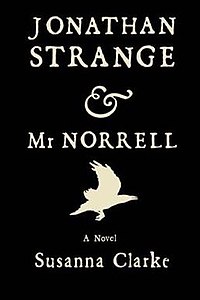1. Jonathan Strange and Mr. Norrell, Susanna Clarke
This book is the one that got away last year, and I plan to tackle it right away this time around. Neil Gaiman helped pluck Susanna Clarke out of obscurity about a decade ago by working to get this book out into the world. It's a magical, fantastical epic that I've been excited to read for a few years, and this time I'm going to take it down. But it's waaaay long, so it might keep me from the rest of my list. Such are the perils of time management.
2. - 4. The Thrawn Trilogy, Timothy Zahn
We have more Star Wars movies in our collective future, and they will feature Luke, Leia, and Han, all of whom are now total Oldsters. Even though J. J. Abrams and Co. are rumored to be creating a new story for the movie, it's hard to imagine that they're going to drastically rewrite the existing canon regarding what happened after Return of the Jedi. I'm told The Thrawn Trilogy - Heir to the Empire, Dark Force Rising, and The Last Command - is an indispensable chapter of the larger saga of these characters, so I'd like to check it out.
5. Flow My Tears, The Policeman Said, Philip K. Dick
It's a Philip K. Dick book with an awesome title that I haven't read yet. That's pretty much all the invitation I need (and you should need).
6. Let Us Now Praise Famous Men, James Agee and Walker Evans
This is not a particularly nerdy book - a chronicle of real 1930s tenant farmers living in dire poverty - but I started reading it late last year after using a number of Library of Congress, Farm Security Administration photos for projects relating to my folk album The Ghost of John Henry. Along with Dorothea Lange and others, Walker Evans was one of a group of photographers engaged by the U.S. government to document life during the Great Depression. Evans and journalist James Agee went to the Deep South and spent several weeks living with a few sharecropper families, ultimately releasing this book as the chronicle of those experiences. But damn is this some dense writing. Agee was trying something new with journalism, combining detailed list-making and straight reportage with modernistic abstractions on the order of something out of T.S. Eliot's poetry. The result is engaging, but exhausting, requiring close and careful reading of each word as they build upon each other to form sentences that go on for pages at a time. I will get through this eventually. Hopefully this Summer.


.jpg)